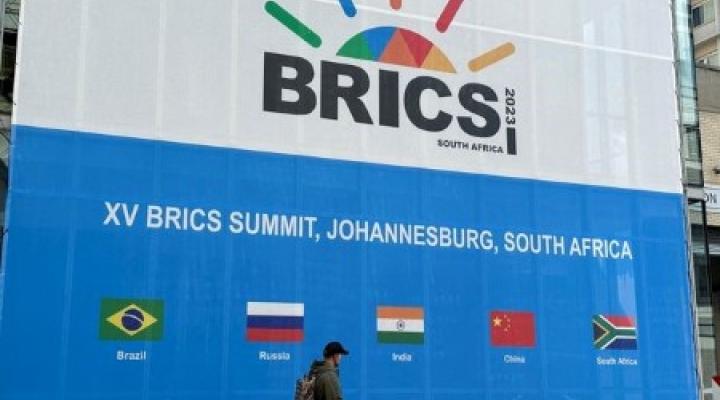
BRICS leaders convene in South Africa on Tuesday, as the coalition of significant emerging economies aims to establish its influence as a counterbalance to Western supremacy in global matters.
The BRICS nations, comprising Brazil, Russia, India, China, and South Africa, which together constitute a quarter of the global economy, are generating heightened interest from countries looking to join the group as the three-day summit in Johannesburg approaches.
Enhanced security measures have been implemented throughout the city where President Cyril Ramaphosa of South Africa will welcome leaders such as China’s President Xi Jinping, India’s Prime Minister Narendra Modi, Brazil’s President Luiz Inacio Lula da Silva, and around 50 other prominent figures.
An international arrest warrant has been issued for Russian President Vladimir Putin on charges of alleged war crimes in Ukraine. As a result, Putin will not be attending in person, and instead, Foreign Minister Sergei Lavrov will represent him at the event.
Spanning three continents and encompassing 40 percent of the world’s population, the BRICS nations possess economies at various stages of growth.
Under the banner of “BRICS and Africa,” the 15th summit is unfolding against the backdrop of an evolving diplomatic contest in Africa.
The continent has become a focal point for renewed rivalry among major powers like the United States, Russia, and China, all vying for economic and diplomatic supremacy.
Ahead of the summit, Ramaphosa stated that his nation would not engage in a rivalry between global powers and emphatically reiterated South Africa’s steadfast commitment to a policy of non-alignment.
Interest In BRICS
Interest in the bloc is on the rise. Originally consisting of four nations in 2009, it expanded the subsequent year with the inclusion of South Africa.
Prior to this summit, officials have indicated that approximately 40 countries, such as Iran, Saudi Arabia, Bangladesh, and Argentina, have conveyed their interest in joining the bloc.
South Africa is set to present a proposal to BRICS leaders for the expansion of its membership, and a decision regarding this matter is anticipated to be reached by the conclusion of the summit.
But analysts are more cautious.
The question of expanding BRICS membership is a divisive topic, especially among its two most influential members, China and India.
China is keen to rapidly grow the bloc and widen its influence but observers say India is wary of the intentions of its regional rival.
“In my view, possible further extension will be considered during the course of this year and not decided at the summit to allow for more time,” said Jannie Rossouw, a professor of global political economy at the University of the Witwatersrand in Johannesburg.
The BRICS function based on consensus, which poses “a major obstacle” to the decision-making process, according to Jakkie Cilliers, the founder of the Pretoria-based Institute for Security Studies (ISS) think tank.
“In the long term, my view is that the inevitability of China-India rivalry is probably the major challenge that BRICS will eventually be confronted with,” he told media.
